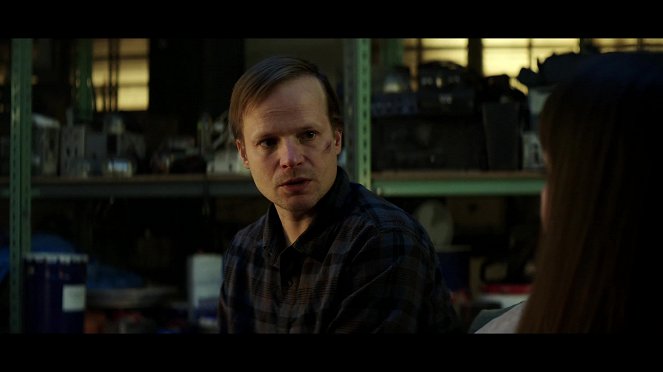Reżyseria:
Petr ZelenkaScenariusz:
Petr ZelenkaZdjęcia:
Alexander ŠurkalaMuzyka:
Janez DovčObsada:
Kryštof Hádek, Jiří Mádl, Veronika Khek Kubařová, Zuzana Fialová, Richard Stanke, Helena Dvořáková, Miroslav Hanuš, Jiří Štrébl, Kristýna Frejová (więcej)Opisy(1)
Współczesna Praga. Dwaj kumple prowadzą dobrze prosperującą wypożyczalnię dronów. Jeden z nich, Plech po godzinach raper, marzy o wielkich pieniądzach i stabilizacji. Drugi – Pavel – właśnie wrócił z zagranicy. Jest chemikiem i znakomitym pilotem dronów. Marzy o sprawiedliwości i własnym wkładzie w naprawę świata. Drony są dla nich przepustką do miejsc i ludzi, do których w inny sposób nie mieliby dostępu. Wśród ich klientów jest kandydat na prezydenta, artyści przygotowujący happeningi czy agencje reklamowe. Z pomocą dronów obserwują elektrownie, noszą na wybiegu luksusowe torebki. Kiedy Pavel postanowi użyć drona do czegoś całkiem innego niż zazwyczaj, sytuacja zacznie się mocno komplikować… (Warsaw Film Festival)
(więcej)Recenzje (5)
Droneman confirms Zelenka’s position as a standout in Czech cinema, who, like the protagonist of his latest film, will be seen by some as an oddball, though he makes our insular vision of the world, which concerns both Czech cinema and the current crisis of values and ideas in Western society, clear to us through the purity and unambiguity of his values. At its core, Droneman is a paradox, as it is a reflection of today from the point of view of a person who does not fit into this time, but who can all the better express the nonsense and paradoxes of the period. Based on the various responses to and reflections on the film, it may seem that Zelenka is unable to effectively communicate with today’s viewers. However, that is not because he is not a capable filmmaker, but because he relies on certain values and their specific meanings. But our current period is characterised by the absolute devaluation of concepts, where grand words like justice, legitimacy, democracy, reason, pride and honour can no longer be perceived on their own at face value. We have to interpret their meaning according to who says them and in what context, based on which they can have completely different meanings and implications. Zelenka thus brings into this world of ambiguity a provocative film that is simultaneously unambiguous and absolute in terms of the filmmaker’s opinions, but dangerously open to viewers. Like the intellectually pure ideas at its core, the film can be appropriated by people across the spectrum of opinion, from conservatives to radicals, who can take it as confirmation of their views. As a story about an individual acting in opposition to the compromises of society, Droneman makes Fight Club seem as if it doesn't contain any unsettling elements at all by comparison, as it relies solely on viewers to correctly interpret it thanks to the fact its ideas are unshakable (though we know that even Fight Club in its real form has paradoxically become a talisman for incels and radicals who simply ignore its final third). In this display of goodwill (or, from today’s perspective, naïveté), Droneman proves to be a meaningful, albeit problematic and exploitable, reflection of the current period. It shows us how terribly confusing the present is for someone who believes in the original value of ideals that have been misused and devalued by political populism, personal opportunism and radical fanaticism. At the same time, the film sticks out like a sore thumb in the context of Czech cinema, which is mired in self-importance and provincialism and only pats itself on the back. Zelenka presents viewers with a mainstream genre film that is set in the present, which serves as its central them, and directly in the narrative thematises the idea that we do not have to concern ourselves only with our own past or the carefree, blurry present, but that we can aspire to something more. That this description is a revelation and not the norm in a film industry that produces more than sixty feature-length movies per year is a telling account of the state of that industry. Just as Buttoners, which also recorded the ethos of its time, particularly fatefulness and existential anxiety in the face of the end of the millennium, Droneman will remain a memento of the age in which it was created, albeit a paradoxical memento.
()
(mniej)
(więcej)
Unfortunately, today's Zelenka is still yesterday's Zelenka. Yet in terms of its individual aspects, Droneman is an excellent film. And as a bonus, there are two well-written supporting roles for Fialová and Kubařová, mature actresses who are regularly forgotten.
()
Just seeing that a new Peter Zelenka film is coming to theaters is enough for me, that's all I care about and I know I'm going to see it. At most I'll allow myself one trailer, but no more; I don't read interviews, I don't check up on anything, I want to be surprised.... and then I'm surprised every time. Droneman is another proof of how great a world-class filmmaker Petr Zelenka is. He takes a subject that touches him deeply, mixes reality with ingenious fiction, and creates a world that literally draws the viewer in and then lets them watch and make up their own minds. Droneman is just that – believable and yet surprising. A Czech film, but with a world view and scope,which it simply isn't afraid of. Petr Zelenka doesn't compromise and makes the film the way he wants to make it, and if the audience is on the same wavelength, they will enjoy this grim, ugly story about the fact that when it comes to down to it you actually have only two choices (which Lenka.Vílka beautifully captured in her comment). The story is as deadly serious as it is absurd, as bleak as it is hopeful, as full of exclamation points as it is of question marks. In the theater, I felt sorry for the audience, who were amused by "Madl talks weird" and "Hádek is weird", grasping at every hint of a joke (actually a pretty cynical smirk) so they could finally laugh again, and walking away shaking their heads at the closing credits. Too bad. The film deals, among other things, with the fact that the Czech courts can't handle the world's problems because they haven't grown into it yet. And it's the same with Droneman – it won't appeal to immature viewers. Too bad and good for them at the same time.
()
Despite current Czech cinema failing miserably at catching up with European standards, a piece of work happens to stand out once in a while, with at least its own face and something to say. And Droneman is exactly one of them. The movie steps out on a risky slope (that is, anywhere but the mainstream) with Kryštof Hádek in a classic “out there” role and Jiří Mádl who has an amusing lisp, and features a bit of everything—be it social satire, quirky comedy or political thriller. How could I not let myself enjoy such a colourful combination of genres in our dull landscape? And what about you? [LFŠ 2020]
()
Droneman is a very strange film, in a good and not so good way. I was definitely intrigued by the rather unorthodox premise by Czech standards, but its impact is (in my opinion) slightly loses in the execution, which offers both strong and bizarre scenes. I can understand the intentions of the makers, who wanted to portray (in)justice and (mis)use of technology, but at times it felt too chaotic and stilted. For example, I found it strange how easily Pavel could get to where he needed to go without anyone being taken aback by his dodgy looks, and the scenes with Veronika Khek Kubařová seemed completely unnecessary. The film is certainly not without courage to show things that are not spoken about out loud, but I had the impression that it could have been done better.
()

